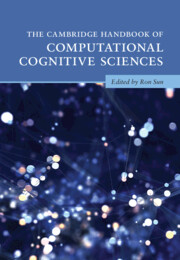Book contents
- The Cambridge Handbook of Computational Cognitive Sciences
- Cambridge Handbooks in Psychology
- The Cambridge Handbook of Computational Cognitive Sciences
- Copyright page
- Contents
- Preface
- Contributors
- Part I Introduction
- Part II Cognitive Modeling Paradigms
- Part III Computational Modeling of Basic Cognitive Functionalities
- Part IV Computational Modeling in Various Cognitive Fields
- 23 Computational Models of Developmental Psychology
- 24 Computational Models in Personality and Social Psychology
- 25 Computational Modeling in Industrial-Organizational Psychology
- 26 Computational Modeling in Psychiatry
- 27 Computational Psycholinguistics
- 28 Natural Language Understanding and Generation
- 29 Computational Models of Creativity
- 30 Computational Models of Emotion and Cognition-Emotion Interaction
- 31 Computational Approaches to Morality
- 32 Cognitive Modeling in Social Simulation
- 33 Cognitive Modeling for Cognitive Engineering
- 34 Modeling Vision
- 35 Models of Multi-Level Motor Control
- Part V General Discussion
- Index
- References
26 - Computational Modeling in Psychiatry
from Part IV - Computational Modeling in Various Cognitive Fields
Published online by Cambridge University Press: 21 April 2023
- The Cambridge Handbook of Computational Cognitive Sciences
- Cambridge Handbooks in Psychology
- The Cambridge Handbook of Computational Cognitive Sciences
- Copyright page
- Contents
- Preface
- Contributors
- Part I Introduction
- Part II Cognitive Modeling Paradigms
- Part III Computational Modeling of Basic Cognitive Functionalities
- Part IV Computational Modeling in Various Cognitive Fields
- 23 Computational Models of Developmental Psychology
- 24 Computational Models in Personality and Social Psychology
- 25 Computational Modeling in Industrial-Organizational Psychology
- 26 Computational Modeling in Psychiatry
- 27 Computational Psycholinguistics
- 28 Natural Language Understanding and Generation
- 29 Computational Models of Creativity
- 30 Computational Models of Emotion and Cognition-Emotion Interaction
- 31 Computational Approaches to Morality
- 32 Cognitive Modeling in Social Simulation
- 33 Cognitive Modeling for Cognitive Engineering
- 34 Modeling Vision
- 35 Models of Multi-Level Motor Control
- Part V General Discussion
- Index
- References
Summary
While psychiatry has made great strides in recent decades toward integrating our increasing understanding of the biological bases of cognition, it nonetheless continues to suffer from imprecise diagnostics and blunt treatment options. Recent advances in computational neuroscience have the potential to address these issues, with a range of neural and cognitive models offering the possibility of a more precise psychiatric nosology with more targeted therapeutics. Here we review a variety of these models, with a special emphasis on their application to addiction, psychosis, anxiety disorders, depression, obsessive-compulsive disorder, autism spectrum disorder, and attention-deficit hyperactivity disorder. We then close with a discussion of potential challenges in incorporating these insights and methods into a clinical setting.
Keywords
- Type
- Chapter
- Information
- The Cambridge Handbook of Computational Cognitive Sciences , pp. 862 - 889Publisher: Cambridge University PressPrint publication year: 2023

